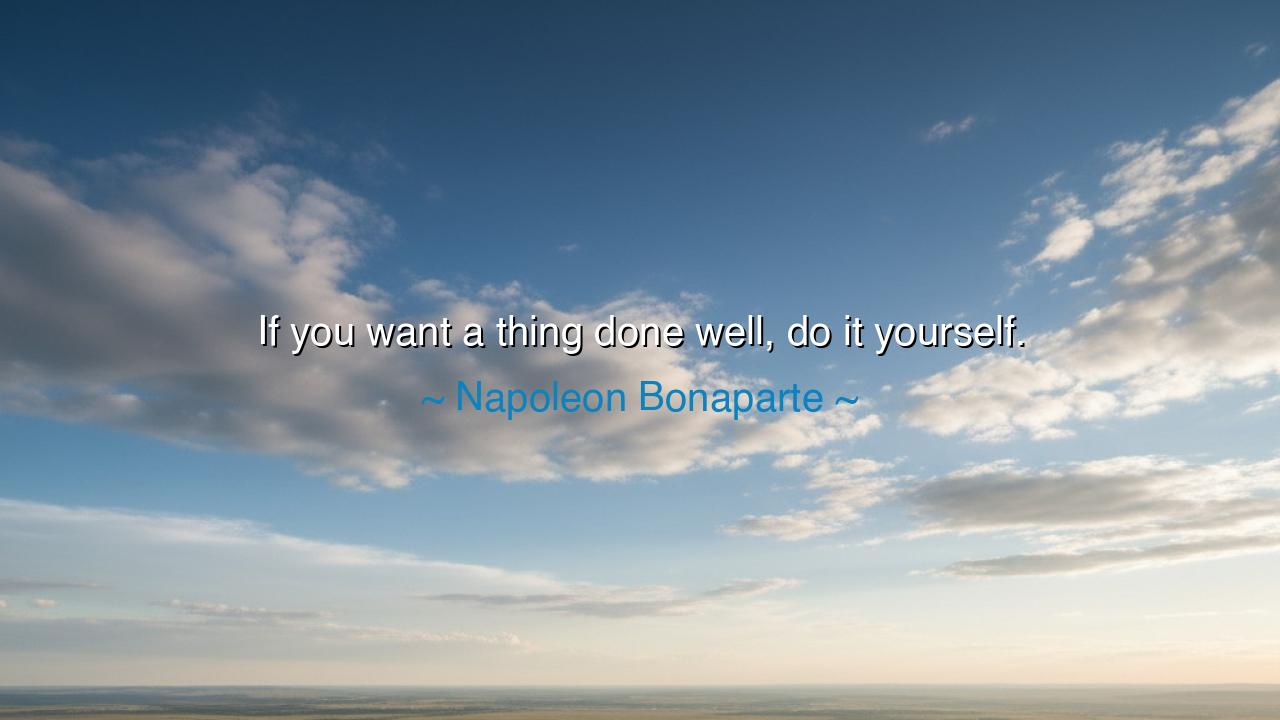
If you want a thing done well, do it yourself.






"If you want a thing done well, do it yourself." Thus thundered Napoleon Bonaparte, the general who rose from obscurity to command empires. His words spring from the battlefield, where hesitation and incompetence meant defeat, and where the only assurance of excellence was in one’s own hand. In them lies an eternal lesson: that to entrust what is vital to others without vigilance is to risk failure, but to seize it with your own will is to secure its success.
The ancients knew this truth in their bones. Alexander the Great led his armies not from afar, but by charging at the front, sword in hand. His men followed because he shared their danger, ensuring that the most crucial task—the breaking of the enemy line—was done by his own arm. For in times of trial, the leader who acts himself leaves no room for doubt. Thus, to do it yourself is not pride alone, but the guarantee that what must be done is done well.
Napoleon himself embodied this principle. At the Siege of Toulon, while still a young officer, he personally directed artillery, positioning the cannons with his own hands when others faltered. His decisive action secured victory and launched his rise. Had he waited upon hesitant superiors, the chance would have slipped away. From that moment, he learned to trust his own vision above all, for he knew that hesitation in others could destroy what boldness in himself could achieve.
Yet history also shows the danger hidden in this creed. Napoleon’s refusal to delegate, his endless drive to shape all by his own will, overburdened him. In the vast campaigns of Europe, one man could no longer command every detail. His genius could not escape exhaustion, and in time, his empire collapsed beneath the weight of one man’s overreach. Thus his words are both inspiration and warning: greatness may begin with "do it yourself," but wisdom must learn when to trust others.
Therefore, let this teaching endure: when the task is sacred, when the moment is perilous, take it in your own hands, and see it done well. But remember also that no man, not even Napoleon, can carry the whole world upon his shoulders. Strive for excellence by your own strength, yet do not despise the strength of others. For the true art of mastery lies not only in doing it yourself, but in teaching others to do it as well.






TTNguyen Thanh Tung
In everyday life, I wrestle with trade-offs: the satisfaction of doing something to my standard versus the opportunity cost. I need a practical rule set for outsourcing. Maybe: if it’s low joy, low learning, and time-intensive, consider handing it off; if it’s high joy or mission-critical, keep it. Add a regret test, a budget cap, and a simple acceptance checklist for contractors. Could you draft a short worksheet that estimates time saved, quality risk, and emotional payoff so choices aren’t just gut calls?
DTTrinh Dinh Tuan
As an engineer, I worry about the “bus factor.” If excellence relies on one person’s hands, resilience is an accident waiting to happen. What structures spread judgment without diluting it? I’m considering a small library of exemplars, style guides with rationale, checklists that capture tacit knowledge, and rotating owners for critical modules. What metrics reveal balance—cycle time, escaped defects, on-call load, mentorship hours? I want a playbook that keeps craftsmanship visible while making it a team property, not a hero sport.
NLnga le
On a psychological level, the impulse to keep control might be competence—or disguised perfectionism. How do I tell the difference? I’d like a quick self-audit: 1) Is the risk existential or just reputational? 2) Have I documented the bar in plain language? 3) Have I offered a safe rehearsal before the real thing? Suggest a two-week experiment where I deliberately transfer a task, set two measurable outcomes, and run a blameless review. What reflective prompts help me track whether this reduces anxiety without wrecking standards?
TGDang thi giang
From a founder’s seat, I’ve shipped features solo to guarantee polish—and paid for it later with team disengagement and brittle code. What’s a pragmatic way to encode standards so excellence scales? I’m thinking: a living “definition of done,” sample artifacts, automated tests for the top three failure modes, and one mandatory pairing session before release. Could you sketch a lightweight quality ritual that lets high standards propagate—without me hovering over every commit or turning handoffs into slow, demoralizing ceremony?
KTNguyen Thi Kieu Trang
As a leader, I feel the tug between personal craftsmanship and organizational scale. Some tasks absolutely benefit from my direct touch; others demand I step back and design a system. Could you propose a simple decision tree for when to keep ownership versus delegate—considering reversibility, stakeholder risk, speed-to-learning, and the teaching value if someone else tries? I’d also like a post-delegation checklist: success criteria, review cadence, escalation triggers, and a “stop doing” list so I don’t become the bottleneck while still protecting quality.